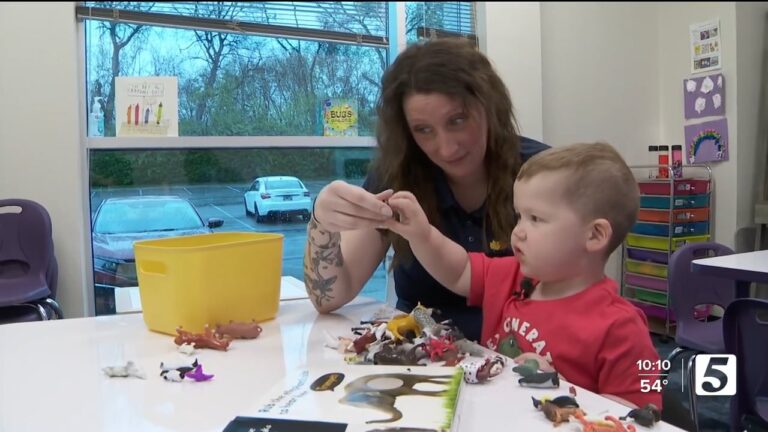Table of Contents
Can my Child with Severe Autism Get Better?”
Autism displays different presentations and challenges, varying wildly from one individual to another. For some living with Autism Spectrum Disorder (ASD), independence and professional success are within reach; however, others encounter more intense difficulties. Referred to as “profound autism,” this level of the spectrum signifies greater severity in symptoms and support needs.
Upon receiving their child’s autism diagnosis, families often question whether their child can lead a self-sufficient life and identify their strengths and limitations. Similarly, families with children exhibiting profound autism may wonder: “Can my child with severe autism get better?” The answer is there is no cure for autism. However, ABA therapy can undoubtedly assist individuals and families in coping with the more challenging facets of the spectrum.
ABA Centers of Tennessee is committed to shedding light on all facets of neurodiversity. Through this article, we aspire to educate and illuminate the path to hope for families in Brentwood, Hendersonville, Nashville, and Madison coping with profound autism.
Profound Autism Explained
Since its introduction in the 2021 New Lancet Commission Report, “profound autism” has been instrumental in outlining the spectrum’s more severe level. It characterizes individuals who possess an IQ under 50, lack self-advocacy through speech, and depend on comprehensive adult support.
Beyond the typical autism traits such as repetitive behavior patterns, sensory processing issues, and social interaction barriers, individuals with profound autism often grapple with an array of complex conditions such as:
- Limited Communication: Individuals with profound autism may possess minimal verbal abilities, if any at all, and depend on nonverbal cues or technological communication aids to interact.
- Intellectual Disability: It is not uncommon for profound autism to coincide with intellectual disabilities, further complicating learning and development.
- Adaptive Function Challenges: Lower adaptive functioning hinders daily independence, making self-care and social engagement challenging and requiring 24/7 care.
- Seizure Disorders: Individuals with profound autism may experience epileptic episodes in various ways, often intertwined with their unique sensory and behavioral characteristics. For instance, some may exhibit repetitive hand-flapping or rocking movements during seizures, which could be mistaken for stereotypical autism behaviors.
- Self-Harm Behaviors: Hitting themselves, biting, or head banging are some of the self-injurious behaviors triggered by the neurological disruption of a seizure.
Why Recognize Profound Autism

The recognition of profound autism holds significant importance for several reasons. Firstly, it facilitates the implementation of highly specialized care strategies tailored to the distinct needs of individuals with severe autism, distinguishing them from those with milder forms of the condition. This targeted approach is crucial in ensuring adequate support and intervention.
Highlighting the unique challenges faced by individuals with profound autism also emphasizes the necessity for their inclusion in therapeutic research and the ongoing evolution of treatment methods. Alison Singer, an advocate and parent intimately familiarized with the complexities of profound autism, underscores the importance of this designation in shedding light on a segment of the autism community that often goes unnoticed – individuals striving for independence and reliant on comprehensive support networks.
In addition, the term “profound autism” serves as a reminder to health professionals, researchers, and the general public, encouraging them to improve their understanding of the needs of individuals with severe symptoms of autism. It underscores the imperative for attentiveness, respect, and empathy in addressing the diverse experiences of individuals across the autism spectrum.
Emerging Insights into Profound Autism
Interest in understanding the nuances of profound autism is on the rise. Key findings demonstrate its prevalence and distinctive characteristics:
- Public Health Reports: Researchers examined data from over 20,000 children aged 8 with ASD from 2000 to 2016. They found that about 27% of these children met the criteria for profound autism, characterized by nonverbal or minimally verbal communication and low IQ.
- Children with profound autism were more likely to be female, from minority ethnic groups, of low socioeconomic status, born prematurely or with low birth weight, exhibit self-injurious behaviors, have seizure disorders, and have lower adaptive functioning scores compared to those without profound autism
- Frontiers: Through a mixed-methods approach, researchers examined the prevalence of profound autism across six samples from the US and Western Europe and conducted interviews with 20 caregivers of profoundly autistic adults. Results showed significant variation in prevalence across the samples, with differences by gender, race, and ethnicity. Despite stigma not being the primary focus, 85% of caregivers reported instances of perceived stigma, highlighting the significant societal challenges faced by this population and their families.
ABA Therapy Helps Individuals and Families with Profound Autism
When discussing individuals with more severe forms of autism, characterized by profound features like constant care needs or complete non-verbal communication, it’s important to emphasize that they are not individuals who cannot receive help or have improvements. Still instead, they are individuals who require more specialized care and support. Contrary to such misconceptions, interventions like Applied Behavior Analysis (ABA) therapy offer not only significant improvements for individuals with autism but also serve as invaluable support for parents navigating the complexities of raising a child on the spectrum.
ABA therapy equips parents with strategies and tools to create supportive environments at home, fostering better understanding and inclusion within the family unit. Therefore, recognizing the potential for growth and development in individuals with profound autism and actively seeking appropriate interventions like ABA therapy can significantly enhance their quality of life and that of their families.
How ABA Centers of Tennessee Provide Support
Families and caregivers of children with profound ASD face a multitude of challenges on a daily basis. By recognizing and embracing the individuality within the spectrum, we can better equip them with the tools and knowledge necessary to provide the best possible support.
At ABA Centers of Tennessee, our primary goal is to empower individuals on the autism spectrum and provide support and education to their caregivers to understand their unique needs and particularities. We are dedicated to improving skills and fostering development, all while considering each client’s unique abilities and aspirations.
For families in Brentwood, Hendersonville, Nashville, Madison, and beyond Tennessee, we are your partners in your autism journey. Call us at (844) 423-9483 or schedule a free appointment for expert guidance and a compassionate community committed to unlocking the potential within every individual.






